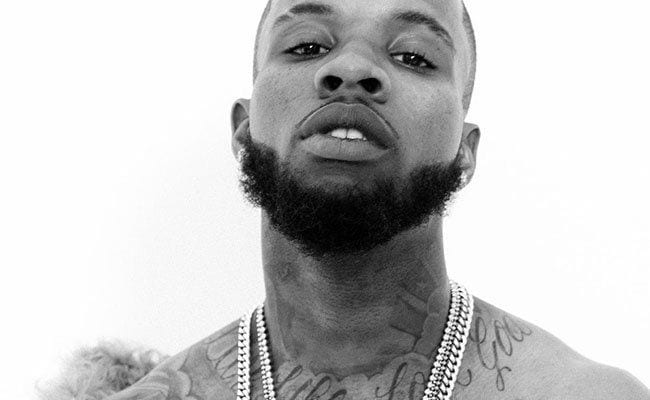
“All the boys in the New Toronto wanna be me a little”
When Drake dropped “Summer Sixteen” earlier this year, before Views slightly nudged him off his throne, the song was a typical self-celebrating power move that magnified Drake’s capacity to inherently come out on top, a trait unique to artist’s of his stature, influence, and success. That’s why, with one dismissive smirk, Tory Lanez, the rapper/singer at the forefront of the New Toronto movement, set himself up to become a punchline. For a while, Lanez was little more than a minion in Drake’s sea. He didn’t quite jack Drake’s aesthetic—many people balance singing with rapping these days—but as a Toronto artist adamant on claiming the scene to himself with little more than a hit to stand on, it was a bit hard to watch him flail with every shot he took. Pair that with the fact that the music he was releasing felt unsubstantial, borrowed, and lacking in any real magnetism, and it’s easy to see how Lanez would spend quite a bit of time perched in the shadow of his superiors. After all, he never gave us a reason to choose him.
If I Told You does anything meaningful, it’s that it attempts to find this reason. Unlike most of the radio artists he so frequently mimics (Drake, Travis Scott, Fetty Wap), the substance of this album does not lie in Lanez’s character as much as it does in his tendency to place himself in the middle of a narrative. Almost every single song here is attached to a skit that attempts to apply context and backstory to the album; instead of turning I Told You into a multi-faceted, gripping story, however, these skits create a trite, rags-to-riches plot that exists almost independently from the music. Released only a year after the blockbuster N.W.A. biopic Straight Outta Compton, the story here is familiar: Lanez gets kicked out of the house, moves in with his girl, and decides to find a life free of gang-banging so he can focus on music. Unfortunately, his commitments to the streets keep coming back, so he wants people to love his music even though they don’t take it seriously, Lanez breaks up with his girl because she can’t keep up with his lifestyle, and then he gets a record deal. If these skits were elegantly tied into the arch of the album, they could give it some flavor and magnitude. Instead, they become a burden, serving as nothing but quasi-epic fluff, turning the record into an overblown, B-movie version of Good Kid, M.A.A.D City, and stretching it into ridiculous 80-minute territory. I can’t fathom anybody listening to this album with the urge to sit through 13 minutes of skits more than once.
The skits are a much bigger part of the album than they need to be, but they shouldn’t negate the music completely. Would this album be better without skits? Yes. Does it work around them? Sometimes. Lanez is definitely not an innovator, but he is a vaguely competent trend-hopper and I Told You houses some of his most forward-thinking and melodically gripping music yet. Sure, most of what he makes is derivative, but sometimes he is able to take this and mold it into something captivating. For instance, “Guns and Roses” proves that Lanez is a master of the falsetto who can create appropriately chilling music as he moans over a nocturnal, acoustic-guitar tinged beat, whereas “Flex” is grandiose and cinematic enough to play into his obvious strengths as a performer. If that was actually Fetty Wap on the hook to “To D.R.E.A.M.” and not just Lanez doing a hilariously obvious Fetty Wap impression, the demonic beat paired with his carnality would make for a serious keeper. But for each moment that transcends, there is a song (“I Told You/Another One”, “Friends With Benefits”, “Question Is”) that is caught up in its mediocrity, doing little more than existing as a product of a great modern listener, an artist who is heavily aware of how you should rap over beats like this but has very little urgency and essence of his own.
Even though this album is beaten into the ground by its skits, there is one skit that is actually a cleverly executed transition into the album’s most rewarding movement. Lanez gets a call from Mike, an Interscope executive, who says that he was so impressed by the music Lanez slid him a couple weeks ago that he wants to sit him down and talk about a deal. Another employee from Interscope, who’s a bit skeptical about whether or not “the kid can make hit records”, urges Mike to put on Lanez’s tape. At this point we hear “All the Girls”, a sun-soaked, catchy love song that seems expertly crafted to impress someone who is looking for a hit, someone who knows Drake might slowly be sliding out of vogue and is searching the market for a glossy, forward-thinking replacement. “All the Girls” is not a hit yet, but the two tracks that follow, “Say It” and “Luv”, definitely are. The former is a soul-tinged sex song in which Lanez crawls into the most outwardly seductive realms of his register, and the latter is an overtly trendy but solid shot at hopping on the dancehall bandwagon. In both cases, the replay value is impressive. However, bunching the hits together at the end the record might just be another backfiring tactic, as the album is too far gone at this point. It closes with thirty seconds of silence, and you get time to ponder the notion that Lanez has never done anything even close to warranting as much ambition

